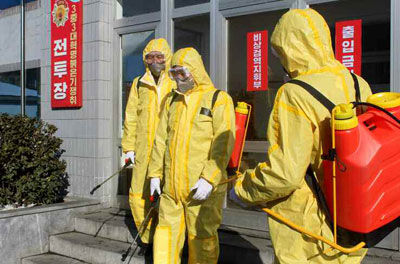With North Korean authorities hesitating to restart train-based trade between Sinuiju and the Chinese city of Dandong, transshipments have reportedly increased between North Korean and Chinese ships. Multiple sources told Daily NK recently that North Korean mineral exports are taking place on the open seas, international sanctions notwithstanding.
According to a Daily NK source in China on Monday, there have been dozens of trade transactions between North Korea and China in the open seas off Nampo since early last month.
The ships reportedly proceed with the transshipments after turning off their automatic identification systems (AIS) before making contact in the high seas.
North Korea has typically exported coal, magnesia clinkers, molybdenum, and other minerals. Molybdenum is a rare metal used in the production of high-strength alloys and superalloys. Demand for the metal has reportedly grown in China as of late.
However, Beijing has expanded domestic coal production to combat recent power shortages while simultaneously diversifying imports, leading to falling coal prices in China.
Accordingly, North Korea is reportedly unable to demand high prices like it did in September and October, when international coal prices skyrocketed.
One North Korean trader contacted by Daily NK said that because of falling coal prices in China, North Korean traders could receive only half of the goods they planned to take from their Chinese counterparts. He complained that it was a “big problem” that North Korea could not import goods as planned.
According to a high-ranking North Korean source, the authorities recently issued a list of priority imports to trading companies through the Ministry of External Economic Relations. The list included rice and corn to alleviate wintertime food shortages.

The authorities also ordered the import of flour, sugar and other ingredients needed to produce candy, cookies, and other confections to provide to citizens on the 110th Day of the Sun next year, otherwise known as the anniversary of the birth of late North Korean leader Kim Il Sung on Apr. 15.
Additionally, the priority import list included agricultural supplies for next year’s farming, such as pesticides, fertilizer, and plastic coverings, and construction materials for the ongoing construction of 10,000 homes in Pyongyang, along with rebar and steel.
However, individual trading companies have also reportedly decided to import consumables such as seasonings, soybean oil, and clothing, depending on regional needs.
North Korean authorities carried out this trading activity based on state plans and targets. They also kept an eye out for smuggling of goods outside the approved list.
According to the high-ranking source, the authorities installed cameras on all ships and placed Ministry of State Security agents on trading vessels to watch over the entire transaction process as part of efforts to stop smuggling or corruption by North Korean traders.
North Korean authorities ordered traders to observe strict quarantine procedures during ship-to-ship transactions, too.
When North Korean and Chinese ships meet in open waters, North Korean crews first spray disinfectant directly on their Chinese counterparts and the goods before they change hands, a process that reportedly takes over an hour.
Because of North Korea’s strict quarantine procedures, ship-to-ship transactions on the open seas that used to take two to four hours to complete now take up to over six hours.
A Chinese person who took part in one such transaction with North Korea said the North Koreans directly sprayed disinfectant on him and other people. The smell was so noxious it made them tear up, he said.
In contrast to the brisk open seas trading centered on Nampo last month, there are still no clear signs that trade will restart in the border city of Sinuiju, where observers speculated last month that international rail service could restart.
South Korea’s National Intelligence Service said during a closed-door audit by the National Assembly’s Intelligence Committee in October that North Korea was discussing with China and Russia plans to restart train service, and that the rail link between Sinuiju and Dandong could reopen in November.
According to another one of Daily NK’s sources in North Korea, a trial run of the international train service between the two cities was conducted last month.
North Korean authorities, however, appear unwilling to reopen train service because of the need to deploy a large number of maintenance personnel along with difficulties importing needed goods due to international sanctions.

















